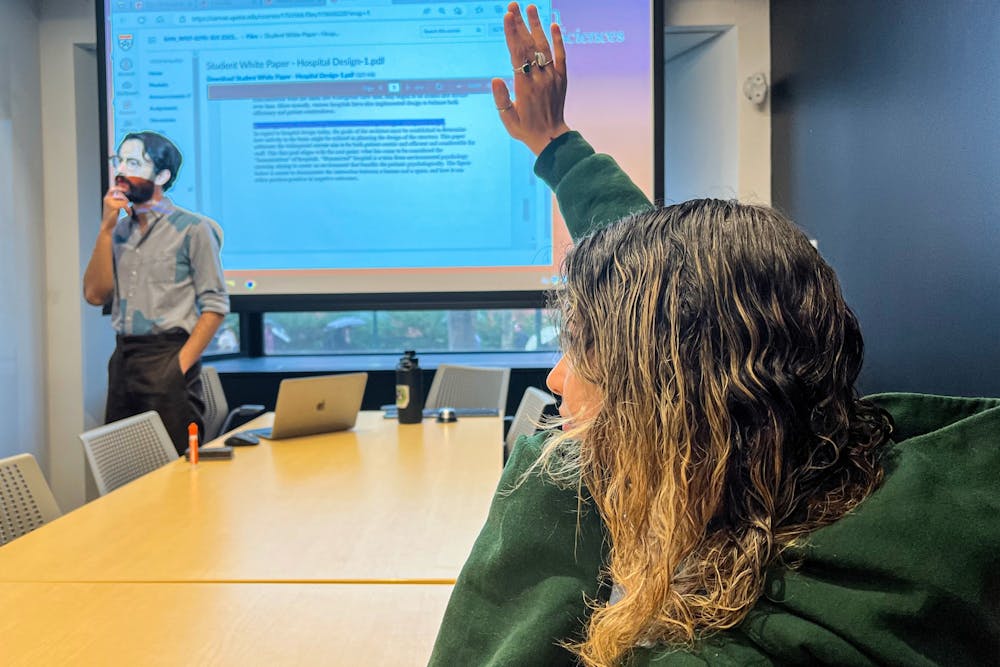
Browse the internet for context. Take note of the author’s background when you do so. And then, research the breadth and depth of what is available on the subject so that you regurgitate rich, wordy literary analysis in class, impressing everyone with your innate, effortless intelligence, even though you knew nothing about the subject just three hours ago.
Come to class prepared with neatly typed or handwritten annotations of your readings. And then, ask a smart question.
Penn students want it all, so they ask it all. Intellectually curious and inclined to participate, they ask every kind of question. In my experience, the obligation of knowing what you should want to ask and what you should want to learn generates a certain internal turmoil even before you open your mouth. This apprehension particularly manifests itself in smaller humanities classes, where participation is often weighed more heavily in comparison to lecture-style STEM courses. As an English major, I find myself anxiously preparing for my discussion-based seminars, so that I can contribute thoughtful, eloquent points, narrowly escaping judgment from my peers and my professor.
The Atlantic recently published an article called “Stop Trying to Ask ‘Smart Questions,’” exploring the design of a “smart question” and arguing that it rarely finds good answers. Paradoxically, Derek Thompson, the author, posits that a "smart question" is incredibly counterproductive to learning, as it often only scratches the surface of a more complex issue.
According to Thompson, here are the characteristics of a suspect “Smart Question”: long and try-hard nonsense often rife with jargon and arcane abbreviations. The “smart” question, then, is really a mini-summary stuffed with contextual knowledge. Often, this so-called try-hard nonsense is used to frame the question as intellectual. Sure, asking a “smart question,” shows you did your research, but it creates an “egotistically ruinous” experience for the rest who have to listen to a garbled speech for what feels like an eternity. The main goal of a “smart question,” really, serves no valuable purpose. It is not a demonstration of intellectual curiosity. It aims to impress an audience instead of exploring a subject thoroughly. Smart questions are not particularly unique nor revolutionary if the motivation is to present a facade of the all-knowing Penn student.
It is also important to distinguish between Thompson’s example of a smart question and a specific question. Arriving to discussions with specific, relevant questions is a characteristic that many good students already possess, as it shows thoughtful engagement with assigned literature. No one is advocating that you waste class time by asking uninformed questions that will deter a rich, probing conversation from taking place.
To clarify, specific questions maximize the productivity of a discussion, guiding students to look at topics from all angles. In an English class it looks something like this: “In this paragraph there is a lot of imagery compared to the rest of the page. What is Dickens trying to convey?” A “smart question” on the other hand, looks like this: “Feminist theorist and writer Simone de Beauvoir wrote prolifically about class welfare and gender, in part due to her exposure to London writers, like Dickens’ work on the tough lives of the working life in particular. What would a feminist like Simone de Beauvoir say about how Dickens writes about women in this passage?”
Here’s another example of this phenomenon existing outside your small humanities seminar. You’re in your Intro to Biology lecture and the week’s material is on DNA replication. Suddenly someone asks about its relevance in senescence, a topic beyond the scope of the class.
Either one of these questions derails your professor for a cool 15 minutes while they clarify what exactly senescence is, or what exactly Simone de Beauvoir thought, before having to speed back to a topic that the entire class can apply their knowledge to.
Both these cases are obvious exaggerations, but the point stands. Obviously, no one wants to look unprepared. But take the pressure off yourself to be the smartest person in the room. You won’t grow without “failure to prepare,” regardless of what kind of class you are in. Perhaps an obvious reminder but an important one: a seminar should engage your intellectual curiosity by stimulating active learning, and that requires a little bit of vulnerability, and a willingness to be wrong.
As Thompson explains, we should ask broader, “stupider” questions instead. Ask the big ones that could help you and your peers delve deeper into the implications and real-world impacts. From their simplicity, they can guide the conversation to more helpful “specific questions.” Broader, “dumb,” questions would center less on, say, a particular statistic mentioned in the reading, but more on the larger social context of how that statistic was arrived at. Critically thinking about the social systems and impacts of a subject is far more fascinating and productive than asking a smart question that would most likely have a dry, unproductive answer.
Perhaps the best way to participate in fruitful dialogue is, yes, still engaging with the material, but to consider valuing other important aspects of classroom discussion. Active listening and building off the responses of your peers in class triumph over any rambling question that prioritizes your perspective over everyone else's.
Pulled directly from my discussion-heavy seminar’s syllabus this semester, my professor says, “We all make mistakes and don’t know some things…part of learning how to argue well about philosophical, political, and conceptual matters is disciplining oneself to avoid counterproductive impulses and strategies like insult, oversimplification, and misrepresentation.”
Chill out with the “smart questions.” Ask instead: what do you want to learn?

CATHY LI is a College sophomore studying English and design from Brooklyn, N.Y. Her email address is licathy@sas.upenn.edu.
The Daily Pennsylvanian is an independent, student-run newspaper. Please consider making a donation to support the coverage that shapes the University. Your generosity ensures a future of strong journalism at Penn.
Donate



